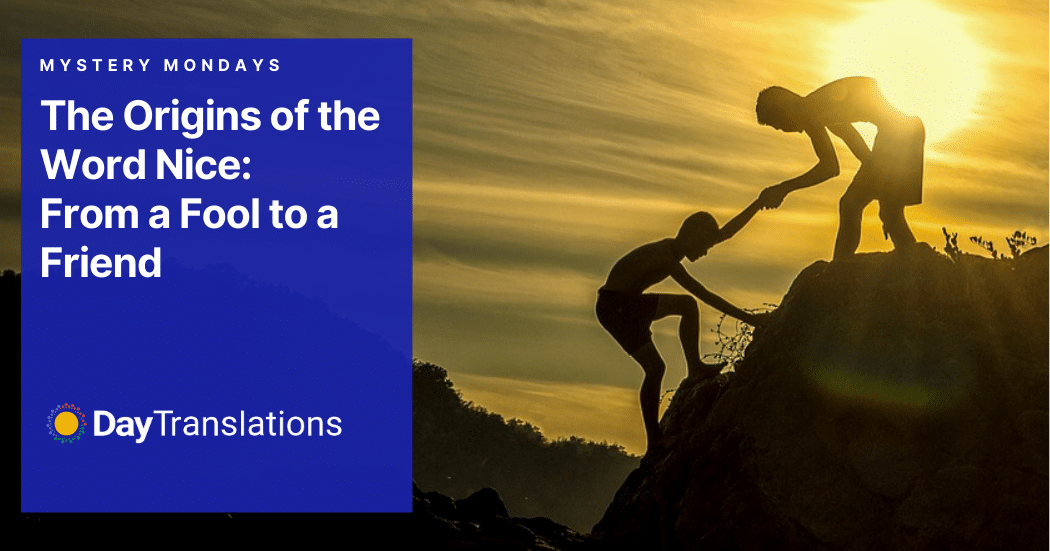You say that someone is nice to praise their kindness, agreement, or pleasantness. Simple, right? But back in the Middle Ages, when you called someone the word “nice,” you were basically calling them foolish, ignorant, or simple-minded. Hardly a compliment.
The transformation of the word nice through centuries is one of the most dramatic semantic journeys in the English language, and that’s exactly why it’s this week’s Mystery Mondays word mystery.
From Ignorant to Blissful Fool
The story starts in Latin, with nescius, meaning not knowing, so, ignorant or unaware. That word evolved into Old French as nice, carrying a similarly negative connotation, “foolish” or “wanton.” English borrowed it in the early 1300s, using it with the same insult.
NPR and Cambridge linguists explain how the word’s Latin root even links it to science: nescius (“not knowing”) and science (“knowing”) come from the same base. So if someone was called nice back then, they had zero clue.
The Grand Semantic Spin on the Word Nice
The word nice didn’t stay an insult. Over centuries, it took us on a semantic roller coaster. Here’s how it evolved:
- Mid-1300s: “Foolish” or “ignorant”
- Late 1300s–1400s: “Wanton” or “lascivious”
- 1400s: “Fastidious” or “fussy”
- 1500s: “Precise”, think a nice distinction
- 1700s: “Agreeable” or “pleasant”
- 1800s–today: “Kind,” “thoughtful,” or just plain nice
This transformation moves through pejoration (getting worse), then swings via amelioration (getting better), a rare modern recovery for a negative-sounding word.
Why Did the Word Nice Do a 180°?
A few reasons push the subtle shift:
- Social tastes evolved: What was “precise” or “fussy” became valued as refinement.
- Irony and nuance: Writers like Chaucer and later Jane Austen used nice ironically, “very nice” could be anything but, helping shift public usage.
- Cultural pressure for kindness: As society leaned toward politeness and manners, nice moved toward praising agreeable character.
Anne Curzan of the University of Michigan points out that in the 1400s context, nice could describe “extravagant or showy dress.” Over time, it softened into something genuinely good.
WordPress and Reddit Agree: Nice Is Nice Now
Language lovers on Reddit are especially fond of nice’s evolution:
“Nice has went through one crazy series of semantic shifts, from ignorant to precise to kind.”
Another user mused:
“Nice wasn’t always nice to be called nice.”
That little twist of irony, calling someone nice, given its original meaning, makes it a perfect Mystery Mondays word.
When Nice Means Too Nice
Fun fact: In Jane Austen’s Northanger Abbey, Henry Tilney quips how “nice” was overused:
“That word… does for everything… originally maybe carried weight, but now means practically nothing.”
Austen was commenting on how language softness, like over-softening nice, can dilute meaning.
Today, nice is so generic it can even feel lukewarm. One modern commentary calls “nice” a catch-all replacement for more precise adjectives, one that feels bland without context.
What the Word Nice Teaches Us
- Language evolves deeply. A word that once stung can become heartwarming.
- Humor and irony shape semantics. Writers wield nice as a double-edged emotional softener.
- Modern speech needs precision. Overusing nice can sound insincere, or just boring.
Final Thoughts
If someone calls you “nice,” remember, back in the 14th century, that wasn’t a compliment. Maybe they meant you were sharp, likable, or thoughtful. But in medieval times? It just meant that you didn’t know much.
Language is full of surprises. Nice just happens to be one of the nicest surprises of all.












Sorry, the comment form is closed at this time.